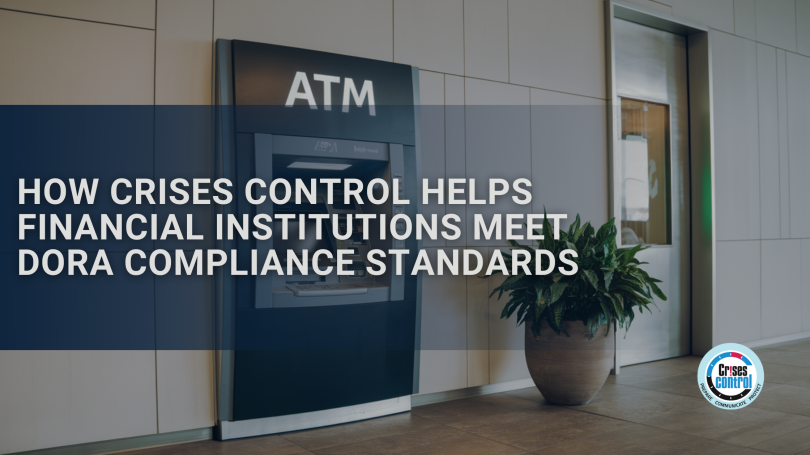Written by Anneri Fourie | Marketing Executive
The Digital Operational Resilience Act (DORA) is a pivotal regulation designed to strengthen the digital resilience of financial institutions within the European Union. By ensuring organisations can withstand, adapt to, and recover from operational disruptions, DORA safeguards not just compliance but also operational stability, customer trust, and data integrity. For financial institutions, achieving DORA compliance is a critical step toward securing their digital ecosystem in an increasingly volatile landscape.
In this blog, we’ll explore how Crises Control, an advanced DORA compliance solution, helps financial institutions align seamlessly with regulatory requirements.
Understanding DORA Compliance
DORA lays out clear requirements aimed at enhancing operational resilience. These include:
Risk Management
Institutions must identify, assess, and manage digital risks proactively. This includes detecting vulnerabilities and implementing measures to minimise disruption.
Incident Reporting
Organisations are required to report digital disruptions promptly and accurately to regulators, ensuring transparency and accountability.
Business Continuity
Robust disaster recovery plans are essential to minimising service interruptions during incidents, ensuring organisations can maintain critical operations.
Third-Party Oversight
Monitoring and managing risks associated with external service providers is a crucial part of operational resilience.
Regular Testing and Audits
Continuous stress testing and audits are mandated to ensure that institutions remain prepared for evolving risks.
By addressing these core pillars, DORA helps financial organisations fortify their operations against potential disruptions, ranging from cyberattacks to technical failures or natural disasters.
How Crises Control Facilitates DORA Compliance
Achieving DORA compliance can be daunting, but Crises Control simplifies this process with its comprehensive suite of tools tailored for financial institutions. Here’s how:
1. Proactive Risk Management
Crises Control offers advanced monitoring systems that detect vulnerabilities in real time, enabling financial institutions to take immediate action. The platform’s analytics tools provide actionable insights, helping organisations mitigate risks before they escalate into significant disruptions.
Why It Matters for DORA: Proactive risk management aligns directly with DORA’s emphasis on identifying and mitigating operational risks, ensuring institutions stay ahead of threats.
2. Incident Reporting and Management
With real-time incident tracking, automated workflows, and compliant reporting templates, Crises Control ensures that financial institutions can report incidents promptly and accurately. The platform also facilitates seamless communication with regulators and stakeholders.
Why It Matters for DORA: Timely and transparent incident reporting not only fulfils regulatory requirements but also builds trust among customers and regulators.
3. Business Continuity and Recovery
Crises Control enables the rapid activation of disaster recovery plans. Its task management features streamline coordination, while regular testing ensures plans remain effective and up to date.
Why It Matters for DORA: DORA mandates robust business continuity strategies to minimise downtime during disruptions. Crises Control ensures institutions are always prepared to maintain service continuity.
4. Managing Third-Party Risks
The platform supports rigorous third-party risk assessments, tracking vendor performance and creating contingency plans for external disruptions. Crises Control helps financial institutions maintain a comprehensive view of their supply chain risks.
Why It Matters for DORA: Third-party dependencies can introduce significant risks. Crises Control’s tools ensure compliance with DORA’s requirements for monitoring and mitigating these risks.
5. Continuous Improvement through Testing
Crises Control facilitates regular stress testing, audit trails, and scenario-based drills, helping organisations refine their resilience strategies. These capabilities ensure financial institutions stay prepared for emerging threats.
Why It Matters for DORA: Continuous testing is critical for maintaining compliance and readiness, as mandated by DORA.
The Crises Control Advantage
Crises Control isn’t just a compliance tool—it’s a comprehensive operational resilience platform. Its features are designed to streamline the complex processes involved in adhering to DORA requirements:
- Ping Mass Notification: Ensures rapid communication during incidents, reaching stakeholders across multiple channels.
- Incident Manager: Provides a centralised system for managing crises, from detection to resolution.
- Task Manager: Automates workflows and ensures teams can respond effectively to disruptions.
- Incident Reporting and Audit: Simplifies the documentation process, ensuring compliance with regulatory reporting requirements.
- Business Continuity Solutions: Offers tools to develop, test, and implement robust disaster recovery plans.
These tools not only make compliance more achievable, but also enhance an organisation’s ability to recover quickly and maintain service continuity in an unpredictable digital landscape.
Why DORA Compliance Matters
DORA compliance is more than a regulatory obligation—it’s a safeguard for an institution’s reputation, customer trust, and operational stability. Non-compliance can lead to hefty penalties, operational setbacks, and reputational damage. By aligning with DORA, financial institutions:
- Strengthen their defence against digital risks.
- Enhance transparency and accountability.
- Ensure uninterrupted service delivery, even during crises.
Partnering with Crises Control for Compliance
Financial institutions face increasing pressure to adapt to the evolving regulatory landscape. Crises Control is uniquely positioned to support this transition, offering a tailored approach to DORA compliance. By leveraging Crises Control’s platform, institutions can streamline compliance efforts, strengthen operational resilience, and focus on delivering value to their customers.
Take the First Step Towards DORA Compliance
Achieving DORA compliance doesn’t have to be a complex or daunting process. With Crises Control, financial institutions gain access to the tools and expertise needed to meet regulatory requirements efficiently and effectively.
Ready to strengthen your organisation’s resilience?
Contact us today for a free demo and see how Crises Control can simplify your path to DORA compliance.
Request a FREE Demo









